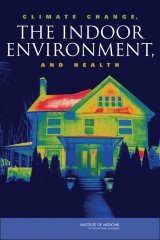Climate Change, Indoor Environment and Health
Report of the Institute of Medicine (IOM) of the National Academy of Sciences

Amid the considerable research on how climate change may affect public health, one subject has received relatively little attention—the impact of climate change on indoor environments. As the world’s climate changes, buildings that were designed to operate under the “old” climatic conditions may not function well under the “new”—affecting the health of those who live, work, study, or play in them. Against this backdrop, the U.S. Environmental Protection Agency (EPA) asked the IOM to summarize the current state of scientific understanding of the effects of climate change on indoor air and public health, and to offer priorities for action.
The IOM concludes that climate change influences indoor environmental quality, warranting attention and action. This conclusion is based on three key findings:
-
Poor indoor environmental quality is creating health problems today and impairs the ability of occupants to work and learn.
-
Climate change may worsen existing indoor environmental problems and introduce new problems.
-
There are opportunities to improve public health while mitigating or adapting to alterations in indoor environmental quality induced by climate change.
In this report, the IOM outlines the major climate-induced indoor environmental problems and recommends ways to reduce the health effects these problems cause. The IOM also recommends a number of specific actions for the EPA to take, in cooperation with other government organizations and the private sector.
- Download the Institute of Medicine report
- Read the Report Brief (pdf) (4 pp, 547 KB)
- Read more about IAQ and climate change:
